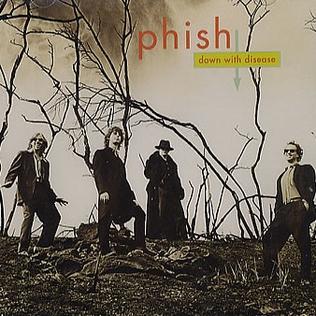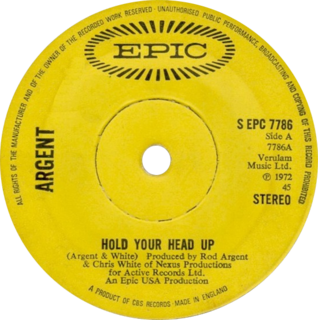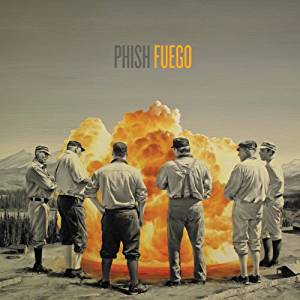
Phish is an American rock band formed in Burlington, Vermont, in 1983. The band is known for musical improvisation, extended jams, blending of genres, and a dedicated fan base. The band consists of guitarist Trey Anastasio, bassist Mike Gordon, drummer Jon Fishman, and keyboardist Page McConnell, all of whom perform vocals, with Anastasio being the primary lead vocalist.

The Meters are an American funk band formed in 1965 in New Orleans by Zigaboo Modeliste (drums), George Porter Jr. (bass), Leo Nocentelli (guitar) and Art Neville (keyboards). The band performed and recorded their own music from the late 1960s until 1977 and played an influential role as backing musicians for other artists, including Lee Dorsey, Robert Palmer, Dr. John, and Allen Toussaint. Their original songs "Cissy Strut" and "Look-Ka Py Py" are considered funk classics.

Ernest Joseph "Trey" Anastasio III is an American guitarist, singer, and songwriter, best known as the lead guitarist of the rock band Phish, which he co-founded in 1983. He is credited by name as composer of 152 Phish original songs, 141 of them as a solo credit, in addition to 41 credits attributed to the band as a whole.

Junta is the debut studio album by the American rock band Phish. The album was self-released by the band in May 1989 without the support from a record label, and received a wider release when Elektra Records reissued it on compact disc in 1992. Junta was preceded by two demo recordings – The White Tape (1986) and The Man Who Stepped Into Yesterday (1987) – which circulated among the band's fanbase but did not receive an official release.

A Picture of Nectar is the third studio album by the American rock band Phish. The album was released on February 18, 1992, by Elektra Records and was the band's debut release for a major record label.

Billy Breathes is the sixth studio album by American rock band Phish, released by Elektra Records on October 15, 1996. The album was credited with connecting the band, known for its jam band concerts and devoted cult following, with a more mainstream audience. The first single, "Free", was the band's most successful song on two Billboard rock charts, peaking at #11 on the Billboard Mainstream Rock Tracks Chart and at #24 on the Billboard Modern Rock Tracks Chart. The album itself became the band's highest-charting album on the Billboard 200, where it peaked at number seven.

The Siket Disc is the eighth studio album by the American rock band Phish. The album was released in June 1999 through the band's website and mail-order service, and was released commercially by Elektra Records on November 7, 2000. Unlike Phish's other records, The Siket Disc is completely instrumental, and its songs are excerpts from studio jams recorded during the sessions for The Story of the Ghost.

Hoist is the fifth studio album by the American rock band Phish, released on March 29, 1994 by Elektra Records. At the time of its release, Hoist was Phish's best selling album to date, peaking at No. 34 on the Billboard 200 albums chart. The album was certified gold by the RIAA on August 19, 1996, and remains the band's best-selling studio release, outsold in their discography only by the platinum-certified A Live One.
The Man Who Stepped into Yesterday is a 1987 concept album written by Trey Anastasio, the guitarist and lead vocalist of the American rock band Phish, as his senior thesis while attending Goddard College. Composed in 1987, the thesis included an essay piece and collection of songs relating an epic tale from the band's fictional land of Gamehendge.
"You Enjoy Myself", commonly abbreviated to "YEM", is a Phish song written by Trey Anastasio, first played live on February 3, 1986. It is the band's most frequently performed song, having been played at about 33% of their first 1,800 shows.

"Quinn the Eskimo " is a folk-rock song written by Bob Dylan and first recorded during The Basement Tapes sessions in 1967. The song was recorded in December 1967 and first released in January 1968 as "Mighty Quinn" by the British band Manfred Mann and became a great success. It has been recorded by a number of performers, often under the "Mighty Quinn" title.

"Birds of a Feather" is a 1998 song by the American band Phish. It is the second track from their 1998 album The Story of the Ghost and was released as their twelfth promotional single by Elektra Records. The song is a funk rock song written by the entire band and lyricist Tom Marshall, and was influenced by Talking Heads.

"Strawberry Letter 23" is a 1971 song written and composed by Shuggie Otis from his 1971 album Freedom Flight. It is also widely known by the 1977 cover version recorded by the Brothers Johnson and produced by Quincy Jones.

Live Phish Vol. 1 was recorded live at the Broome County Veterans Memorial Arena in Binghamton, New York on December 14, 1995. The show occurred towards the end of the band's 1995 fall tour, which featured a tour-long chess game between Phish and its audience. The second disc begins with a fan making a chess move onstage on behalf of the audience.

"Down with Disease" is a 1994 song by American band Phish. It is the second track from their 1994 album Hoist and was released as their fifth promotional single by Elektra Records. The song is a funk rock song written by Phish guitarist and lead vocalist Trey Anastasio and lyricist Tom Marshall. The song's lyrics were based on a bout with infectious mononucleosis suffered by Marshall.

"Hold Your Head Up" is a song by the English rock band Argent, released as a single in 1972. The song was a Top 5 hit in both the US and UK, peaking at No. 5 in both countries. However, it was the band's only song to chart on the Billboard Hot 100. Billboard ranked it as the No. 50 song for 1972. The song appeared on the third Argent album All Together Now (1972). The album version is 6:15 while the single version is 3:15. The DJ edit has a run-time of 2:53.

Fuego is the thirteenth studio album by the American rock band Phish, released on June 24, 2014 on the band's own JEMP Records label.

"Chalk Dust Torture" is a 1992 song by the American band Phish. It is the thirteenth track from their 1992 album A Picture of Nectar and was also released as their first promotional single by Elektra Records. The song is a riff-based, fast-paced rock song written by Phish guitarist and lead vocalist Trey Anastasio and lyricist Tom Marshall. The studio recording features a lowered pitch effect on Anastasio's lead vocal.

Kasvot Växt: í rokk is a live album by American jam band Phish. It was released on music streaming services on November 9, 2018. It is a recording of the second set of their Halloween concert on October 31, 2018, at the MGM Grand Garden Arena in Paradise, Nevada, in which the band performed music credited to "Kasvot Växt", a fictional Scandinavian progressive rock band. The ten songs played during this set were attributed to this band, and purported to appear on their 1981 album í rokk, but were in reality new original Phish songs, all of which have entered their live repertoire in varying capacities.
















